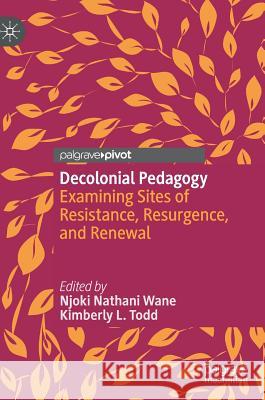Decolonial Pedagogy: Examining Sites of Resistance, Resurgence, and Renewal » książka
topmenu
Decolonial Pedagogy: Examining Sites of Resistance, Resurgence, and Renewal
ISBN-13: 9783030015381 / Angielski / Twarda / 2018 / 144 str.
Kategorie:
Kategorie BISAC:
Wydawca:
Palgrave Pivot
Język:
Angielski
ISBN-13:
9783030015381
Rok wydania:
2018
Wydanie:
2018
Ilość stron:
144
Waga:
0.34 kg
Wymiary:
21.01 x 14.81 x 1.12
Oprawa:
Twarda
Wolumenów:
01
Dodatkowe informacje:
Wydanie ilustrowane











